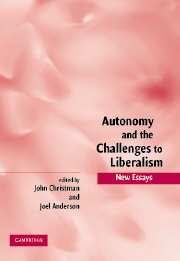Book contents
- Frontmatter
- Contents
- Contributors
- Preface
- Autonomy and the Challenges to Liberalism
- 1 Introduction
- PART I THE SELF: CONCEPTIONS OF THE AUTONOMOUS SELF
- PART II THE INTERPERSONAL: PERSONAL AUTHORITY AND INTERPERSONAL RECOGNITION
- PART III THE SOCIAL: PUBLIC POLICY AND LIBERAL PRINCIPLES
- 8 Autonomy, Domination, and the Republican Challenge to Liberalism
- 9 Liberal Autonomy and Consumer Sovereignty
- 10 Political Liberty: Integrating Five Conceptions of Autonomy
- PART IV THE POLITICAL: LIBERALISM, LEGITIMACY, AND PUBLIC REASON
- Bibliography
- Index
10 - Political Liberty: Integrating Five Conceptions of Autonomy
Published online by Cambridge University Press: 02 December 2009
- Frontmatter
- Contents
- Contributors
- Preface
- Autonomy and the Challenges to Liberalism
- 1 Introduction
- PART I THE SELF: CONCEPTIONS OF THE AUTONOMOUS SELF
- PART II THE INTERPERSONAL: PERSONAL AUTHORITY AND INTERPERSONAL RECOGNITION
- PART III THE SOCIAL: PUBLIC POLICY AND LIBERAL PRINCIPLES
- 8 Autonomy, Domination, and the Republican Challenge to Liberalism
- 9 Liberal Autonomy and Consumer Sovereignty
- 10 Political Liberty: Integrating Five Conceptions of Autonomy
- PART IV THE POLITICAL: LIBERALISM, LEGITIMACY, AND PUBLIC REASON
- Bibliography
- Index
Summary
1. Although “liberty” today is generally recognized as a fundamental criterion for the legitimacy of a society's basic institutional structure, disputes over its content continue unabated. Within the history of political philosophy as well as in contemporary debates, a wide variety of theories provide competing accounts, ranging from republicanism to Marxism, from libertarianism to various forms of liberalism (“perfectionist” or “political”). In the following, I want to suggest that the best way out of these controversies can be found in an intersubjectivist concept of political liberty comprised of an adequate integration of five different conceptions of individual autonomy.
2. The term “political liberty” is used here in a rather broad sense, including both the republican “liberty of the ancients” and the liberal “liberty of the moderns.” In contrast to the more narrow notion of “political autonomy” – the participation in the exercise of political self-rule – “political liberty” is understood as the liberty that persons have as citizens of a political community – that is, the liberty that they can claim as citizens and that they must grant each other as citizens.
3. The “intersubjectivist” approach I defend is not to be confused with communitarian approaches, according to which a person can be free only if his or her individual life is part of and constituted by the “larger life” of a political community that provides its citizens with a sense of the good and virtuous life.
- Type
- Chapter
- Information
- Autonomy and the Challenges to LiberalismNew Essays, pp. 226 - 242Publisher: Cambridge University PressPrint publication year: 2005
- 14
- Cited by

